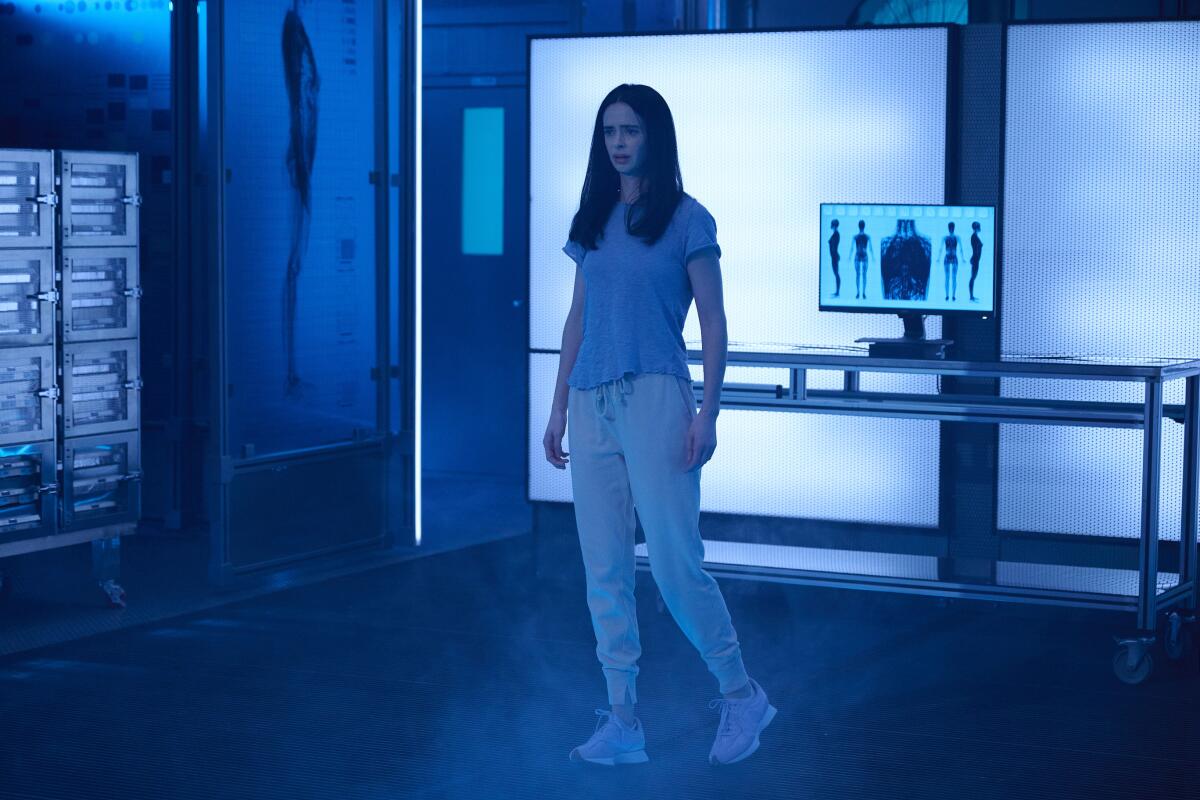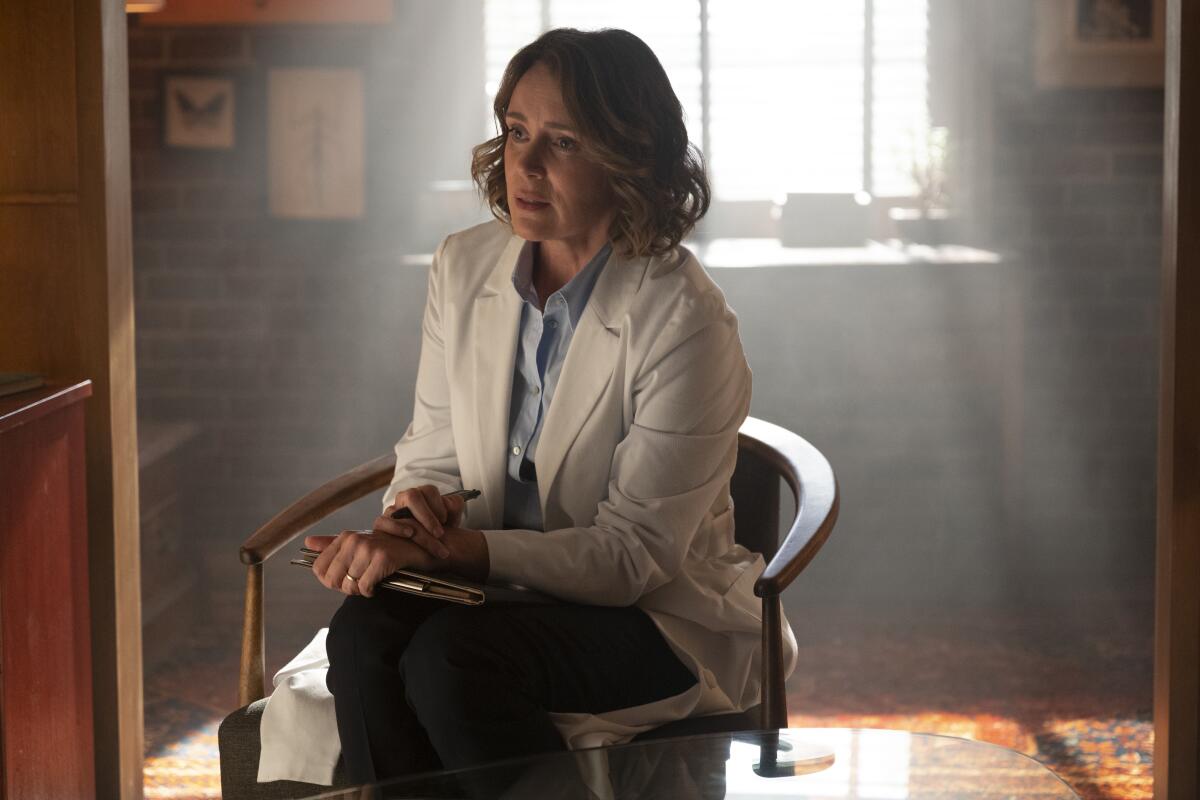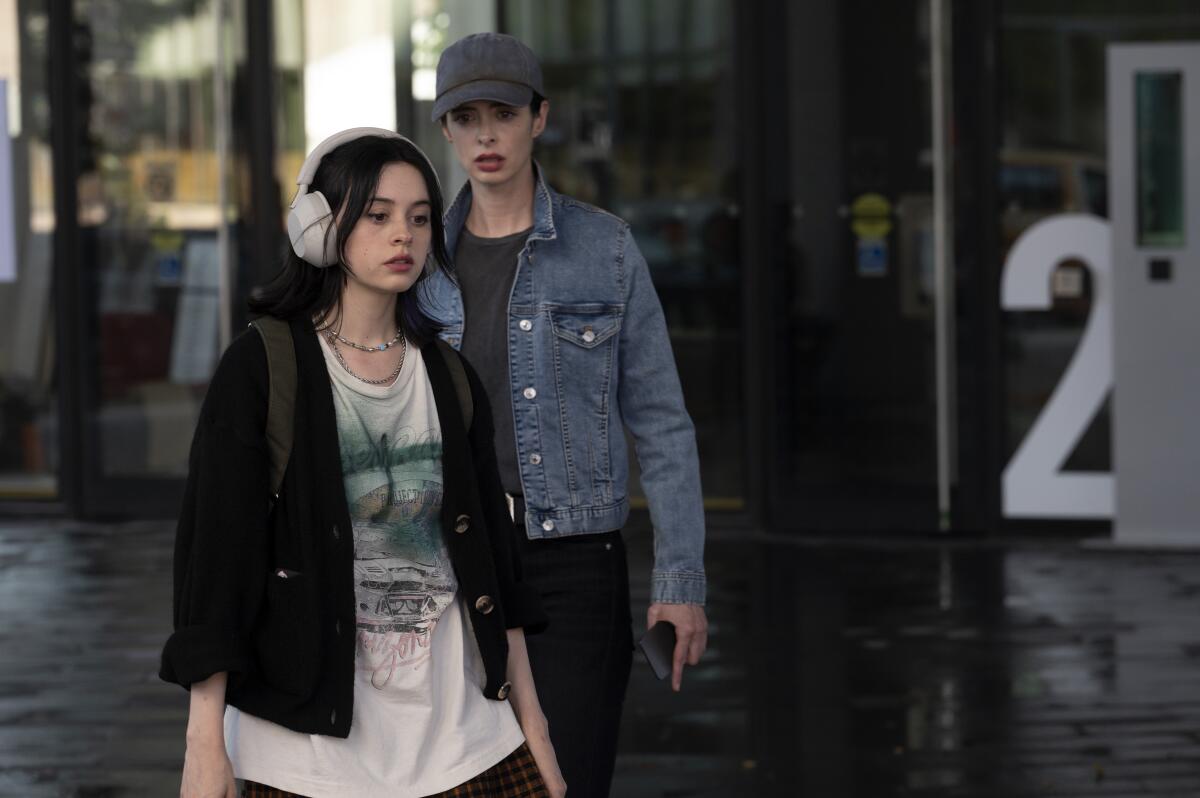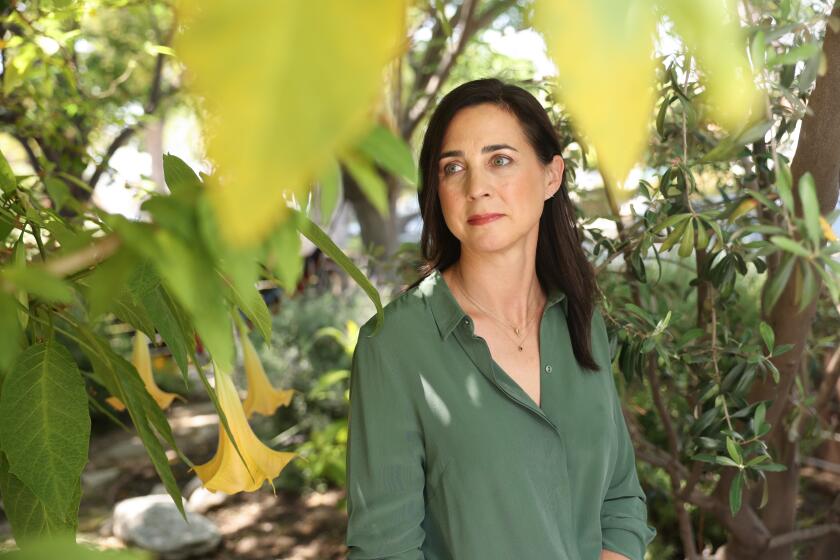‘Orphan Black: Echoes’ mirrors a television industry desperate to reclaim its glory days

- Share via
This article contains spoilers for the first episode of “Orphan Black: Echoes.”
Sometimes a new television show illuminates the limitless possibilities of the art form. And sometimes it reveals that art form’s struggles.
“Orphan Black: Echoes” is precisely what the title implies — a far-off reverberation of an original event, in many ways mirroring the state of television at the moment, scrambling to reclaim its former glory.
This is not to damn “Echoes.” If it was not attached to a masterwork, it could be viewed as a perfectly serviceable, mildly futurist contemplation of the perils of life-replicating technology, deeply rooted in “Frankenstein,” and the vast “what have I wrought?” genre of science-regret that rose in its wake.
In the pilot, which aired Sunday on AMC, Lucy (Krysten Ritter) wakes up on a living room sofa. She is immediately, and kindly, questioned by a woman in a white coat (Keeley Hawes) who is very interested in the state of Lucy’s memory. When it becomes clear that Lucy has no memory, of anything at all, things get a bit … agitated.
Soon enough, Lucy has broken out of the living room, only to discover that it is just a set in a warehouse full of all sorts of funky “science” equipment — weird X-rays, slowly turning fans and a box full of pink goo that contains a half-formed human. The scientist appears and gently informs Lucy that she is the result of cutting-edge technology, a flesh and blood “print-out” of human tissue.

Like any good Frankenstein monster, Lucy runs away and somehow creates an off-the-grid life, complete with a lovely boyfriend (Avan Jogia) and his equally lovely deaf daughter (Zariella Langford-Haughton). Not surprisingly, many people are looking for Lucy, and while her perpetually worried creator insists that Lucy is not violent, others are not so sure.
In place of villagers with pitchforks, Lucy does battle with those who want her returned to the lab and/or killed (allowing Ritter to show off her “Jessica Jones” fighting skills). Attempting to find and confront her creator, Lucy sees a younger version of herself — a teenager by the name of Jules (Amanda Fix) — and realizes she is not the only walking-talking printout in existence.
It isn’t until the end of the hour, as she makes a call to her aunt Cosima, that Hawes’ scientist is revealed to be none other than Kira, the child at the center of so much of the drama in “Orphan Black.” To underscore this, the camera sweeps across Kira’s desk, showing photos of Cosima (Tatiana Maslany), her mother Sarah (also Maslany), Felix (Jordan Gavaris) and Mrs. S (Maria Doyle Kennedy).
The shot is, frankly, a big mistake and serves as an instant reminder of how much viewers will miss “Orphan Black.” Despite the fact that both were made by AMC and BBC America, “Echoes” cannot hold a cloned candle to “Orphan Black.” It is not just a different show, it’s a very different type of show, one that takes itself far more seriously than “Orphan Black” ever did.

Although there is delicious irony to be had in the daughter of a clone getting into the human replicating business, the series is not interested in playing with that. In fact, it doesn’t play much at all, remaining, at least in early episodes, unrelievedly serious — even Felix, showing up in a regrettable “look, I’m-older!” wig, hat and glasses, is not allowed to provide the outrageousness and humor that made him such a key player in the original.
Creator Anna Fishko has been clear about her desire to distance “Echoes” from its progenitor, but her methods of doing so strand the narrative in no-man’s land, with Kira’s identity being more of a distraction than a main event, while everyone misses Cosima and all of her clone sestras.
More important is the refusal, by anyone, to mine the absurdity of the situation. Only Jules is allowed to have any fun at all, but even she is confined to angsty teenage anger.
“Orphan Black: Echoes” creator and showrunner Anna Fishko says this latest iteration of the sci-fi series, starring Krysten Ritter, is more a complement than a copy of the original.
“Orphan Black: Echoes” has Ritter and Hawes, two fine performers, and, as the plot unfolds, an at-times powerful subplot about how far the pain of loss can drive you. But the thing it does best, alas, is remind the world of how truly great and radically under appreciated “Orphan Black” was, and what a mess television has become since it debuted.
In 2013, Maslany dazzled viewers as an ever-expanding group of disparate, and desperate, clones trying to figure out how they came to exist, and who was trying to kill them.
The show arrived at a moment when television had exploded with new platforms and scripted shows that drew obsessively dedicated audiences. AMC was still caught up in the glory of “Mad Men” and “Breaking Bad;” “Orange Is the New Black” and “The Blacklist” had just premiered and “Downton Abbey” and “Game of Thrones” were hitting their strides. Netflix fully entered the game with “House of Cards” while Prime Video test-ballooned “Alpha House.” The problems of “Peak TV” were years away.
Created by Graeme Manson and John Fawcett, “Orphan Black” snuck into the mix as the best sort of sci-fi series. Its reality was not so much re-imagined as slightly tweaked, which allowed the narrative to examine current cultural fault-lines — between science and religion, rich and poor, the individual and the collective — while asking the basic question great art always asks: Who are we really?
The clones became powerful, and often hilarious proof, of how different humans can be while still being essentially the same. Hyper-controlled soccer mom Alison, former street-savvy foster kid Sarah, genius scientist Cosima and whacked-out assassin Helena questioned the morality of extreme science while battling nefarious forces, but they also a hell of a lot of fun to watch.
It was an astonishing feat, by Maslany, of course, but also the writers and the rest of the cast, that impressed most critics (including me) and regular viewers, amassing a devoted fan base dubbed #CloneClub.
But amid the growing cacophony of television’s creative revolution, “Orphan Black” never quite achieved the stature it deserved.
Though Maslany (finally) won an Emmy in 2016, none of the writers, supporting actors or the show itself were similarly acknowledged, which had more to do with the state of the industry than the show itself.
This summer, you’ll have to say goodbye to at least one series, but you’ll get to say hello to revivals of “Orphan Black” and “Yo Gabba Gabba!,” some mystery miniseries and music-centered docuseries.
It’s not that “Orphan Black” got lost in the shuffle — its fans were numerous and very vocal. It just never quite occupied the cultural conversation in the way “Mad Men” or “House of Cards” did.
Perhaps it was too sci-fi, or female-centric, or Canadian for its time; perhaps Maslany’s lack of previous stardom made it a tough sell. Whatever the reason, “Orphan Black” remained a mostly word-of-mouth show that should be in the pantheon of work that created television’s modern Golden Age.
Perhaps it will now that “Echoes” is part of television’s Repurposing Age, in which successful series are sold off for parts or recycled entirely.
Television, like Broadway and film, has become more interested in replicating the past than investing in the future, churning out endless sequels, prequels and reboots. As with most things, some of them work — ”Better Call Saul,” Young Sheldon” — some of them don’t — ”Rings of Power,” “And Just Like That” — and some land in between — “House of the Dragon.”
Taken together, however, these regenerative shows reveal an industry attempting to recapture, or cling to, the Golden Age without understanding what made it golden. Television became the ascendant art form of the 21st century because new and re-imaged platforms were willing to swing big, take risks and defy conventional wisdom.
Obviously, the realities of Peak TV, and the welter of streaming services currently competing for eyeballs, create financial pressure that did not exist in those halcyon days. But images grow less vivid the more they are copied and you can’t be groundbreaking if you’re continually mining ground that has already been broken.
More to Read
The complete guide to home viewing
Get Screen Gab for everything about the TV shows and streaming movies everyone’s talking about.
You may occasionally receive promotional content from the Los Angeles Times.









